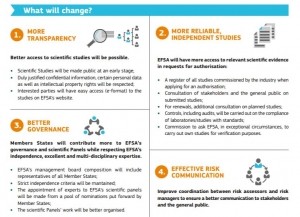Cautious backing for plan to boost transparency of EFSA risk assessments

“Better access to industry studies used in EFSA risk assessments is insufficient without usage and quotation rights,” said the Brussels based activists, Corporate Europe Observatory (CEO).
The campaigners were reacting to the EU Commission’s proposal, announced on Wednesday (April 11), to reform the EU risk assessment model in relation to transparency.

The EC is looking to restore public trust in scientific studies on food safety; its plan for reform is a direct response to the European Citizens' Initiative (ECI) on the controversial herbicide glyphosate. The ECI demanded, “all studies used to back up regulatory approval of pesticides must be published.”
The EU executive said it wants to provide “additional guarantees of reliability, objectivity and independence of the studies used by EFSA in risk assessments.”
Under the plan, the Commission could ask the European Food Safety Authority (EFSA) to commission its own, additional scientific studies in controversial cases, with the financing for that research to come out of the EU budget.
The Commission is pushing for the draft measures, still to be debated in the EU Parliament and by member states, to be adopted by mid-2019.
Its proposal aims to update the 2002 EU General Food Law with the following measures:
- EFSA shall publish all studies underpinning a product authorization request, except for certain confidential data specified in the proposal.
- Industry shall notify EFSA of any study it commissions to demonstrate the safety of its products. A list of these studies will be compiled in a publicly accessible EU register managed by EFSA.
- Industry applicants will have the possibility to seek EFSA’s advice on the content and completeness of authorization dossiers before submitting them. The advice received from EFSA will be made public.
- Member states should involve themselves more in EFSA by sending representatives to the agency's management board and proposing scientists who could sit on EFSA panels of experts.
The Commission has released a Q&A on the proposals.
Reactions
An EFSA spokesperson said the Authority strongly welcomes the proposals: “Several proposals are directly aligned with current or planned initiatives by EFSA.”
Martin Pigeon, food policy campaigner at CEO, said automatic and pro-active publication of previously confidential industry study data in a machine-readable format is an important first step in the right direction.
He also welcomed the creation of a public register of studies to prevent industry from submitting only results favorable to their products to EFSA.
“But the Commission’s proposal features a big caveat that means anyone wanting to quote and use the data will need to ask permission to do so from the company that has provided EFSA with this data,” added Pigeon. “This creates a huge risk that industry will block any scientific scrutiny of EFSA’s assessment of their products. If scientists cannot quote this data in scientific publications there will be only a limited incentive for the scientific community to double-check EFSA’s work.
He argued the publication of “much-needed independent cross checks of industry data must not depend on the goodwill of private entities whose primary objective is to make a profit, not to protect public health and the environment.”
European Consumer Organization, BEUC, said it backs the Commission’s intention to increase the transparency of EFSA scientific assessments.
“The way the EU allows products such as food additives or pesticides onto the market deserves a transparency boost.”
BEUC said the planned register of commissioned studies would prevent the hiding away of any industry research giving unfavorable results.
John Brennan, secretary general of EuropaBio, said the biotech trade supports the objective to increase connection with the public and trust in the risk assessment process.
"Transparency and sustainability of the EU’s risk assessment, including its efficiency, consistency and robustness, are equally important to build public trust and to spur needed innovation in agriculture and food. We would like to see more transparency in the rules of procedure for risk assessment, and from member states when it comes to whether or not they vote with the scientific evidence assessing product safety," he added.
He said EuropaBio recommends a holistic approach to strengthening trust and transparency, including when it comes to GMOs, and supports a step change in communication. "Improved risk communication should do more to highlight the integrity and quality of EFSA’s scientific opinions in an understandable manner, and address the spread and sources of misinformation and conspiracy theories that have eroded trust in some innovative products like GMOs."















